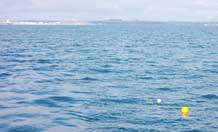Articles

Underwater sound recorders were used in Falmouth Bay for 14 months
Experts listen in on noisy Falmouth seas
A long-term plan for managing noise in shallow parts of the ocean such as Falmouth Bay is needed to protect the environment, scientists have said.
Manmade noise in the marine environment can increase stress in animals, alter their behaviour, and displace them from habitats important to their daily lives.
There has so far been limited scientific research on methods to assess long-term trends in marine noise in coastal regions, but engineers and biologists from the Universities of Exeter and Bath, have been investigating how best to monitor this increasing human influence in our seas.
They used underwater sound recorders in Falmouth Bay for 14 months at a marine renewable energy test site and have found managing noise in shallow coastal environments will likely require a very different strategy to other, deeper ocean environments.
Lead author of the research, Dr Joanne Garrett, from the University of Exeter’s Environment and Sustainability Institute (ESI), said: “We found considerable variation in noise throughout the year. As well as anthropogenic noise sources such as shipping, we found that natural environmental conditions, such as waves and tide, also affect the sound levels.
“Both of these factors highlight the need for tailored and long-term monitoring to develop a robust understanding of our effects on the marine environment”.
Dr Matthew Witt, also from the ESI, said: “This work underlines the need for continued and focused research in the area of human noise, both on techniques to collect, analyse and interpret data, and on the biological implications of noise on marine species and consequences for marine ecosystems upon which we are so very much dependent.”
Dr Philippe Blondel, from the University of Bath’s Centre for Space, Atmosphere and Oceanic Science, said: “This work provides much-needed data to inform the debate about the impacts of human activities on marine environments, by providing measurements over several years in a sensitive and important area of the British Isles.
“This data will be extremely useful to both European regulators, who lead the way in terms of environmental monitoring, and standardisation bodies like British Standards and the International Standards Organization.”
This work was funded by the European Social Fund (Garrett), the Peninsula Research Institute for Marine Renewable Energy (PRIMaRE; funded by the South West Regional Development Agency), MERiFIC (funded by the European Regional Development Fund) and Innovate UK (Fred.Olsen Renewables at FaBTest).
Long term underwater sound measurements in the shipping noise indicator bands 63 Hz and 125 Hz from the port of Falmouth Bay by Garrett, J., Blondel, Ph., Godley, B., Pikesley, S., Witt, M. J and Johanning, L. is published in the journal Marine Pollution Bulletin.
Date: 6 July 2016
